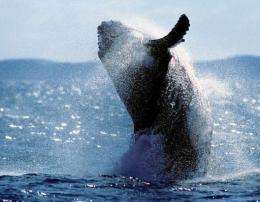Proposed kill quotas for whales too high: scientists

The International Whaling Commission starts a key meeting Monday to debate catch quotas which could replace a moratorium on hunting though a key scientific committee will say the catch limits are too high, sources said.
The 88-nation body will debate the proposal, put forward by the IWC's chairmen in an attempt to break a 24-year deadlock that has nearly wrecked the global whaling regime.
Despite a 1986 moratorium on the commercial hunting of whales, Japan, Norway and Iceland have flouted the ban and still kill the animals, more than 1,500 in the 2008-2009 season alone.
The draft deal tables reduced annual catch numbers through 2020 for four species of whale as a baseline for negotiations, in the hope of coaxing the renegades back into the IWC fold.
Under the scheme, total allowable kills in each of the first five years would be just over 90 percent of the 2008-2009 figure, dropping further from 2015 to 2020.
The IWC's own scientific committee is set to say that these numbers are not sustainable, committee members said.
Using a formula based on estimates of population levels, scientists calculated that the proposed catches were far too high for the North Pacific Bryde's whales, and double tolerable limits for North Atlantic fin whales and eastern North Atlantic minke whales.
Only for the central North Atlantic minke whales were the tabled suggestions well under conservation-safe limits, they found.
"Science has been sidelined during the negotiations," said Scott Baker, a marine biologist at Oregon State University and a committee member since 1994.
Like Japan's kill quotas for so-called "scientific research", the new figures "don't correspond to a scientific reality," said Jean Benoit Charrassin, a researcher at France's Museum of Natural History and a long-standing IWC scientist.
The proposal pays lip service to advice from the Scientific Committee, but the IWC has yet to adopt methods its experts laid out in 1994 -- in a so-called Revised Management Procedure, or RMP -- on how to calculate safe limits and verify they are respected, he said.
Justin Cooke, a committee member from the International Union for the Conservation of Nature (IUCN), described the plan as a "sham."
"It gives the impression that catch limits would be based on the RMP, but in fact they are arbitrary results of negotiation."
For many populations of species targeted by commercial whalers, most scientists agree, it is simply not known how many remain in the wild and how dramatically they may have been depleted.
Without these data, sustainable catch levels are unknowable, and should thus trigger a "zero catch" policy under RMP, opponents of the deal say.
The scientific report also underscores the problem of so-called "by-catch", the ostensibly accidental killing of whales in fishing nets.
From 1994 to 2006, Japan and South Korea each caught more than 1,000 minke whales in their coastal waters this way, according to government statistics.
DNA analysis suggests that the real number of whales killed in the same waters by by-catch is likely twice as high, according to a recent study in Animal Conservation, a journal of the Zoological Society of London.
New Zealand's Foreign Minister Murray McCully, leading his country's delegation in Agadir, said he was pressing for further concessions from Japan over whaling in the Southern Ocean.
"They've shown some encouraging signs, they've stayed in the room, they've not been taking some of the inflexible positions we've seen in the past," he told Radio New Zealand.
But he added that finding common ground between whaling nations and their opponents was "a pretty big task" -- and that failure by the IWC to find a solution could lead to "anarchy on the high seas".
Japan's influential newspaper Ashai Shimbun newspaper -- noting a decline in whale meat consumption among Japanese over the years -- meanwhile called on Tokyo to agree to a compromise plan.
"We should calmly think whether there is a rational reason to insist on (whale hunting) in the Antarctic Sea and commit massive efforts to fighting anti-whaling nations and violent environmental groups," it said.
(c) 2010 AFP














